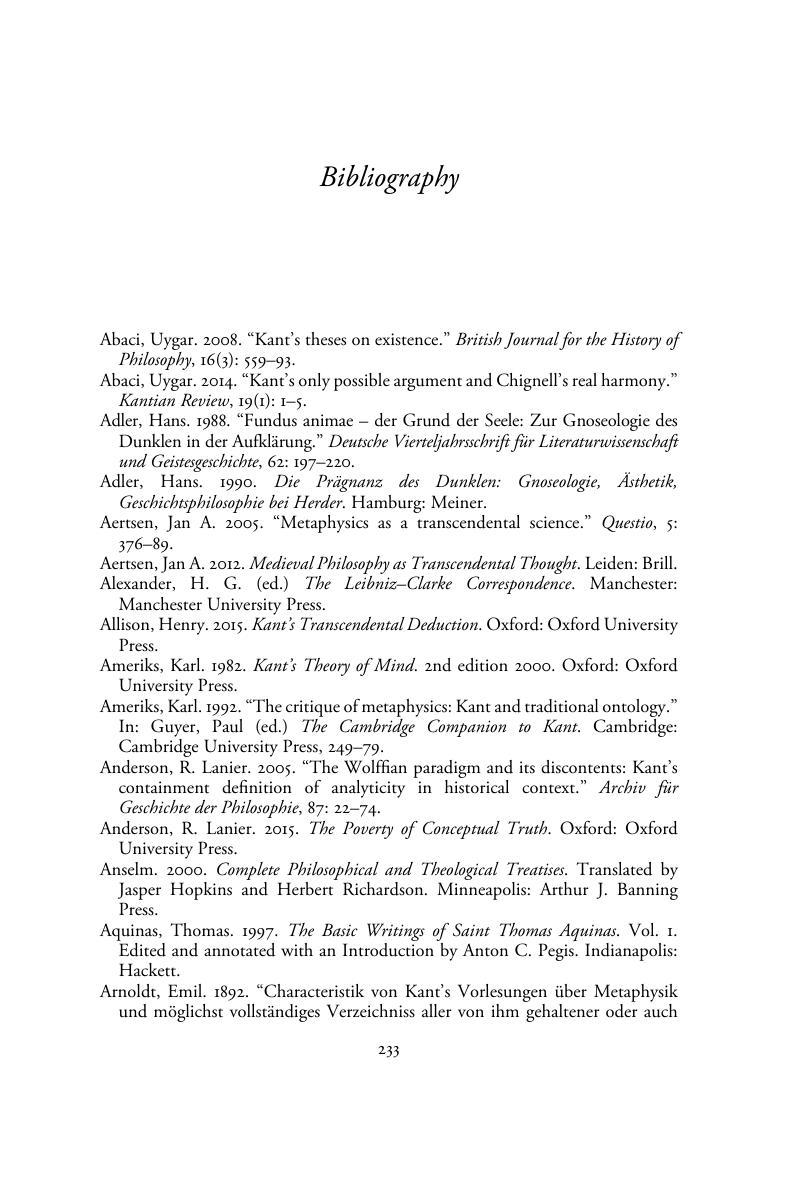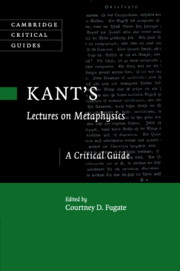Book contents
- KANT’S LECTURES ON METAPHYSICS
- Cambridge Critical Guides
- Kant’s Lectures on Metaphysics
- Copyright page
- Contents
- Contributors
- Abbreviations
- Introduction
- Chapter 1 Herder as Interpreter of Kant’s Philosophy
- Chapter 2 The Prolegomena to Kant’s Lectures on Metaphysics
- Chapter 3 Ontology as Transcendental Philosophy
- Chapter 4 A Guide to Ground in Kant’s Lectures on Metaphysics
- Chapter 5 Space and Time in Kant’s Lectures on Metaphysics
- Chapter 6 Kant’s Cosmology, Miracles and the Autonomy of Reason
- Chapter 7 Kant’s Aesthetics in his Lectures on Metaphysics
- Chapter 8 Kant’s Metaphysics of Freedom (1775–1782): Theoretical and Practical Perspectives
- Chapter 9 From Anthropology to Rational Psychology in Kant’s Lectures on Metaphysics
- Chapter 10 Baumgarten and Kant on Rational Theology: Deism, Theism and the Role of Analogy
- Bibliography
- Index
- Cambridge Critical Guides(continued from p. ii)
- References
Bibliography
Published online by Cambridge University Press: 17 January 2019
- KANT’S LECTURES ON METAPHYSICS
- Cambridge Critical Guides
- Kant’s Lectures on Metaphysics
- Copyright page
- Contents
- Contributors
- Abbreviations
- Introduction
- Chapter 1 Herder as Interpreter of Kant’s Philosophy
- Chapter 2 The Prolegomena to Kant’s Lectures on Metaphysics
- Chapter 3 Ontology as Transcendental Philosophy
- Chapter 4 A Guide to Ground in Kant’s Lectures on Metaphysics
- Chapter 5 Space and Time in Kant’s Lectures on Metaphysics
- Chapter 6 Kant’s Cosmology, Miracles and the Autonomy of Reason
- Chapter 7 Kant’s Aesthetics in his Lectures on Metaphysics
- Chapter 8 Kant’s Metaphysics of Freedom (1775–1782): Theoretical and Practical Perspectives
- Chapter 9 From Anthropology to Rational Psychology in Kant’s Lectures on Metaphysics
- Chapter 10 Baumgarten and Kant on Rational Theology: Deism, Theism and the Role of Analogy
- Bibliography
- Index
- Cambridge Critical Guides(continued from p. ii)
- References
Summary

Information
- Type
- Chapter
- Information
- Kant's Lectures on MetaphysicsA Critical Guide, pp. 233 - 244Publisher: Cambridge University PressPrint publication year: 2019
